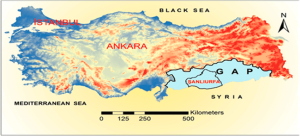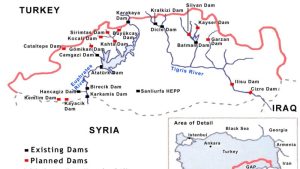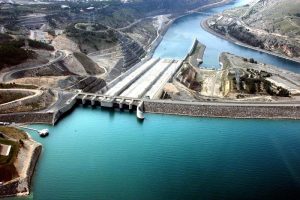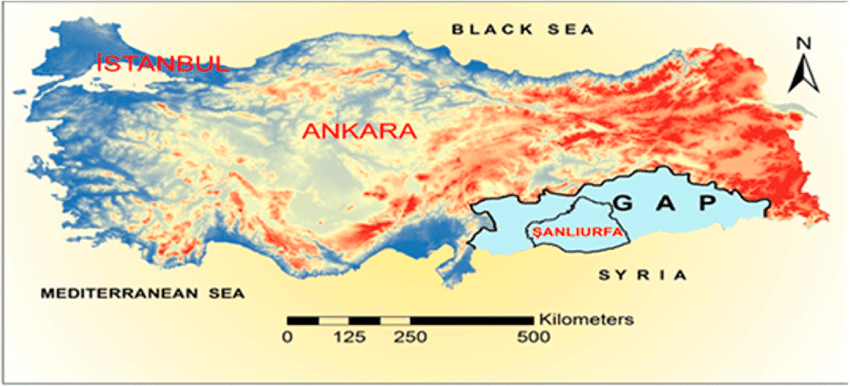Turkey’s extensive dam-building initiatives, particularly along the Tigris and Euphrates rivers, have profound implications for neighboring countries, especially Iraq and Syria. These projects not only threaten the water supply and agricultural viability in these nations but also pose serious risks to the marine ecosystem of the Persian Gulf. This article delves into how Turkey’s infrastructure developments are drying up rivers, impacting regional ecosystems, and violating international treaties regarding shared water resources.


The Context of Water Politics in the Tigris-Euphrates Basin
The Tigris and Euphrates rivers are vital water sources for Iraq and Syria, supporting agriculture, drinking water supplies, and biodiversity. The rivers originate in Turkey, where the government has embarked on an ambitious Southeastern Anatolia Project (GAP), which includes 22 dams and 19 hydroelectric power plants. Since the initiation of these projects in the 1970s, it is estimated that Turkey’s dam constructions have reduced Iraq’s water supply from these rivers by approximately 80%. The construction of the Ilisu Dam, one of the most controversial projects, is projected to further reduce the Tigris River’s flow into Iraq by an additional 56%.

Consequences for Iraq
The impact of reduced river flows is particularly severe in Iraq. The United Nations Environment Program has reported that Iraq is losing around 61,000 acres of arable land annually due to environmental changes linked to diminished water supply. As water levels in the Tigris have plummeted, residents of Baghdad have experienced conditions so dire that some could wade across parts of the river. The Mesopotamian Marshes, once a thriving ecosystem supporting numerous species, have also been adversely affected. Following a brief recovery after being drained during Saddam Hussein’s regime, these marshes are now threatened again due to reduced water inflow from Turkey’s dams.The agricultural sector in Iraq has been particularly hard hit. Farmers rely heavily on irrigation from these rivers; with dwindling water supplies, crop yields have plummeted. Reports indicate that Iraq is losing approximately 25,000 hectares of arable land annually due to desertification and salinization exacerbated by insufficient water flow. This situation not only threatens food security but also contributes to increased poverty and displacement among rural populations.
Impact on Syria
Syria faces similar challenges as Turkey continues to restrict water flow from the Euphrates. Water flow into Syria has decreased by an estimated 40% due to Turkey’s dam projects. This reduction has severe implications for agricultural production in a country already grappling with water scarcity exacerbated by years of civil conflict and climate change. The long drought that began in 2006 devastated Syria’s agriculture, forcing large numbers of people into cities and contributing to social unrest.The Syrian government has expressed concerns over Turkey’s unilateral actions regarding shared water resources. With total annual water withdrawal reaching 160% of internal renewable resources by 2011—compared to 80% in Iraq and 20% in Turkey—Syria is facing an acute water crisis that threatens its stability.
Ecological Consequences for the Persian Gulf
The repercussions of Turkey’s dam construction extend beyond Iraq and Syria; they also threaten the marine ecosystem of the Persian Gulf. The reduced flow of freshwater into this vital body of water can lead to increased salinity levels, disrupting marine habitats essential for fish populations critical to local economies reliant on fishing. Increased salinity can negatively impact species diversity and productivity in a region already stressed by pollution and overfishing.Moreover, as wetlands in Iraq dry up due to diminished river flows, migratory bird populations that rely on these habitats are declining. In winter 2018 alone, bird populations in the Mesopotamian Marshes saw a staggering 74% decline, largely attributed to reduced water availability from upstream projects. This loss not only affects biodiversity but also impacts local communities that depend on these birds for cultural and economic reasons.
Ignoring International Treaties
Turkey’s actions regarding dam construction have raised significant concerns about its adherence to international treaties governing shared water resources. Agreements such as the United Nations Convention on the Law of Non-Navigational Uses of International Watercourses emphasize the need for cooperation among riparian states, requiring prior notification and consultation before undertaking projects that may significantly affect downstream countries.Despite these obligations, Turkey has largely ignored the rights of neighboring countries like Iraq and Syria who benefit from these rivers. The lack of meaningful dialogue or agreements has led to heightened tensions in a region already fraught with conflict. The Turkish government’s unilateral decisions regarding dam construction not only contravene established international norms but also exacerbate existing geopolitical tensions.
International Relations and Future Prospects
The ongoing water crisis has strained diplomatic relations among Turkey, Iraq, and Syria. Despite calls for cooperation over shared resources, Turkey has maintained a stance prioritizing its national interests in managing its water resources. While there have been attempts at dialogue—such as a memorandum of understanding requesting fair water distribution—these efforts have yet to yield binding agreements that ensure sustainable management of shared waters.The international community has a role to play in mediating this conflict. There is an urgent need for collaborative frameworks that address the rights of downstream countries while considering Turkey’s developmental goals. Without such agreements, tensions may escalate further as communities grapple with worsening water shortages and ecological degradation.
Conclusion
Turkey’s extensive dam-building initiatives along the Tigris and Euphrates rivers pose significant challenges for both Iraq and Syria, leading to severe reductions in river flows that threaten agriculture and ecosystems. The impacts extend beyond national borders into the Persian Gulf marine environment, highlighting the interconnectedness of regional water politics. Addressing these issues requires urgent international attention and cooperative efforts among affected nations to ensure sustainable management of shared water resources for future generations while respecting international treaties designed to protect riparian rights.

